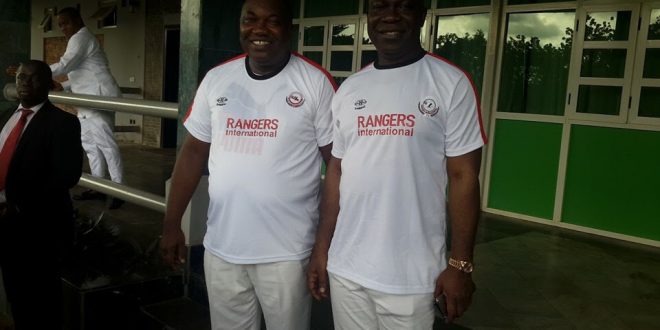
Permit me to pay a special tribute to a great football club this week – Rangers International Football Club of Enugu.
Many would wonder why I am doing so, knowing that the football club was the greatest rival to the club I played for through most of my football career – IICC Shooting Stars of Ibadan.
Between the two clubs, Rangers and Shooting Stars of Ibadan, they defined and set the agenda for football development in Nigeria for almost two decades. Some of the best and most reliable friends that I cultivated through the course of my life in sports, even till this day, came from Rangers FC. Our friendship has been deep and strong, and sustains till this day!
Incidentally, the last year of my football career also marked the last time Rangers International won the most prestigious football title in the land – the national league. That was some 32 years ago! That’s how long it has taken them to re-mount the podium of victory once again.
I will not blame any young person below the age of 32, therefore, that wonders why I would dedicate my entire column this week to write about a team that, all things being equal, will become the next champion of the Nigerian Premier League this weekend.
It is not the feat itself that is significant but the story of the team; where it is coming from; what it represents in the story of Nigeria; and what its current achievement means to football and to the country as a whole.
There will be jubilation and celebration in several towns and villages around Nigeria today when Rangers finally lifts the trophy that has eluded them for so long.
This club was raised from the ashes of the Nigerian Civil war in 1970, its significance rooted in the name given to it by one of its founders, the late Justice Ikpeazu.
When the war ended and was declared ‘No Winner, No Vanquished’ by the then Nigerian Head of State, General Yakubu Gowon, it was clear that the Igbo people needed more than those words to bury the humiliation of surrender and to spearhead a full psychological and physical re-integration into the main stream of social life and political engagements in the country, devoid of the stigma of a conquered people.
The Igbos, a very proud and hardworking people, with an awesome reputation for their industry and commercial sixth sense, needed a Get-out-of-jail card for their re-entry to a new Nigeria.
The leadership anchored their intention to an innocent weapon that they believed would not fail – a football club named after one of their most devastating weapons during the civil war, a cannon that inflicted massive destruction on the enemy, called the Ranger!
The political leaders at the time, including Dr. Jim Nwobodo, the first civilian governor of Enugu State, founded the football club and called it Enugu Rangers Football Club.
Not many people knew that during the most bloody civil war in history, that claimed over 2 million Nigerian lives on both sides of the conflict, the war was temporarily halted (voluntarily by both armies) so that the fighting soldiers of both armies could listen to the radio commentaries of a football match between Santos FC of Brazil, and a Nigerian selected side at the King George V stadium, Onikan Lagos, that featured the legendary Pele.That match was a clear demonstration how much Nigerians loved and followed their country’s number one sport.
The Igbos latched onto that passion and presented this all-conquering football club, to fast-track and catalyse their return.
In 1970, the march of Rangers Football Club of Enugu began. That year it got to the finals of the FA Cup and lost narrowly.
The following year, and for the next decade, it dominated Nigerian football like no other club had ever done in the history of the country, and achieved for the Igbo people what guns could not on the battlefield!
Rangers International FC conquered Nigerian football winning everything in the land by playing football crafted from the battlefields of Biafra – physicality, ferocity, skills, determination, fighting spirit and a never-say-die attitude.
They took those attributes to the rest of Africa and for several years they were in the chase for the Africa Club championships, going farther than any other Nigerian team before it, but never winning it. Their trademark then was that for any team that played against Rangers it was akin to walking blindfolded onto a brick wall. They were a very difficult and hard nut to crack. All African clubs that met Rangers FC and survived always had their own unique experience and story to tell.
They were truly a fighting army of footballers hewn and honed by war, playing every match as if their lives depended on winning it, and making opposing teams seek protective gear to withstand the physicality, speed, strength, power and indomitable spirit.
Until Enyimba Football Club of Aba arrived the scene in the 2000s, Rangers FC held the record of being the most successful club in the history of Nigerian football, winning more national trophies than any other club and matching the continental achievements of their greatest rivals, Shooting Stars FC.
Rangers International of Enugu were a movement of the Igbo people all over the world. The Igbo rallied around the team and made it the flagship of their re-absorption into life in Nigeria.
In one year, in the early part of 1975 and 1976, Rangers FC supplied 7 of the 11 players in the Nigerian national team, the Green Eagles.
The team produced some of the greatest names in Nigerian football at the time –
‘Chairman’ Christian Chukwu (MVP of the 1980 Africa Cup of Nations);
‘the tallest’ Emmanuel Okala (ASJU’s African Player of the Year);
‘Block buster’ Alloysius Atuegbu;
‘speedster’ Emeka Onyeadika;
‘Captain of Captains’ Godwin Achebe;
‘Alhaji’ Dominic Nwobodo;
‘Dan Vadis’ Nwabueze Nwankwo;
‘Chief Justice’ Adokiye Amiesimaka;
and many more, a long list of legendary footballers that changed the face of football in Nigeria.
The significance of Rangers’ victory this weekend is a reminder that Nigeria itself can be great again, a country like the team, too big and too rich in its historical antecedents to suffer relegation.
Today, it gives me great pleasure to celebrate this great Nigerian club that represents a great version of Nigeria’s history in football.
As Rangers FC march unto a new dawn this weekend, I wish them well.
Congratulations!
 Hottestgistnaija.com
Hottestgistnaija.com





